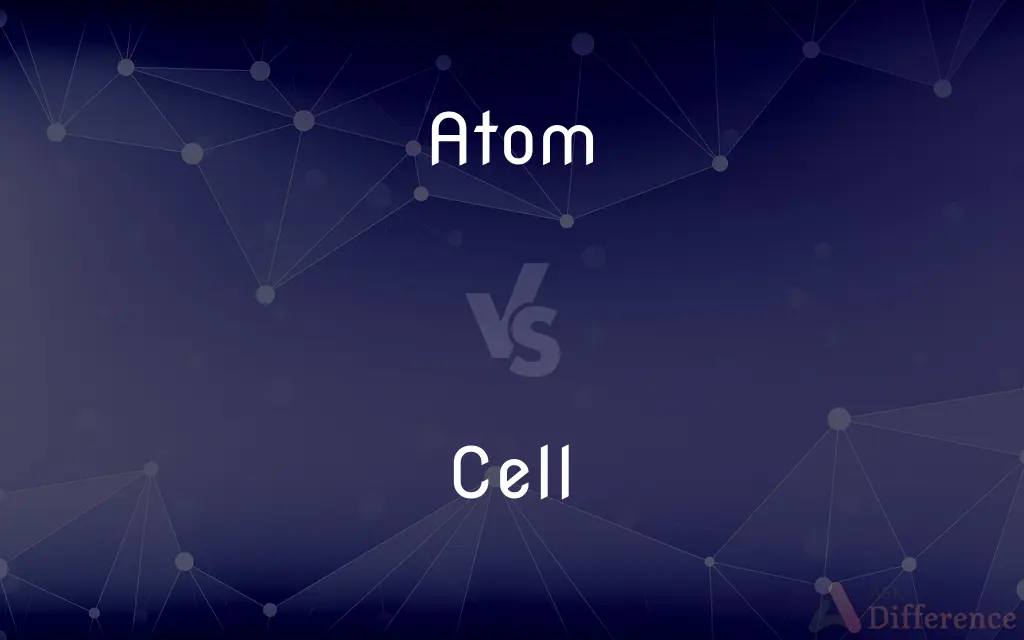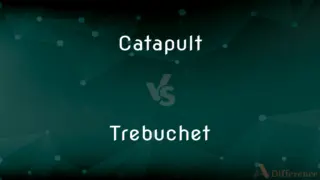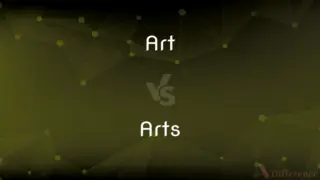Atom vs. Cell — What's the Difference?

Difference Between Atom and Cell
ADVERTISEMENT
Compare with Definitions
Atom
An atom is the smallest unit of ordinary matter that forms a chemical element. Every solid, liquid, gas, and plasma is composed of neutral or ionized atoms.
Cell
A narrow confining room, as in a prison or convent.
Atom
A part or particle considered to be an irreducible constituent of a specified system.
Cell
A small enclosed cavity or space, such as a compartment in a honeycomb or within a plant ovary or an area bordered by veins in an insect's wing.
Atom
The irreducible, indestructible material unit postulated by ancient atomism.
ADVERTISEMENT
Cell
(Biology) The smallest structural unit of an organism that is capable of independent functioning, consisting of cytoplasm, usually one nucleus, and various other organelles, all surrounded by a semipermeable cell membrane.
Atom
An extremely small part, quantity, or amount.
Cell
(Architecture) See web.
Atom
The smallest unit of an element, having all the characteristics of that element and consisting of a very small and dense central nucleus containing protons and neutrons, surrounded by one or more shells of orbiting electrons. Atoms remain undivided in chemical reactions except for the donation, acceptance, or exchange of valence electrons.
Cell
The smallest organizational unit of a clandestine group or movement, such as a banned political movement or a terrorist group. A cell's leader is often the only person who knows members of the organization outside the cell.
Atom
This unit regarded as a source of nuclear energy.
Cell
A single unit for electrolysis or conversion of chemical into electric energy, usually consisting of a container with electrodes and an electrolyte; a battery. Also called electrochemical cell.
Atom
The smallest possible amount of matter which still retains its identity as a chemical element, now known to consist of a nucleus surrounded by electrons.
Cell
A single unit that converts radiant energy into electric energy
A solar cell.
Atom
(history of science) A hypothetical particle posited by Greek philosophers as an ultimate and indivisible component of matter.
Cell
A fuel cell.
Atom
The smallest, indivisible constituent part or unit of something.
Cell
A geographic area or zone surrounding a transmitter in a cellular telephone system.
Atom
(philosophy) In logical atomism, a fundamental fact that cannot be further broken down.
Cell
A cellphone.
Atom
(historical) The smallest medieval unit of time, equal to fifteen ninety-fourths of a second.
Cell
(Computers) A basic unit of storage in a computer memory that can hold one unit of information, such as a character or word.
Atom
A mote of dust in a sunbeam.
Cell
A storm cell.
Atom
A very small amount; a whit.
Cell
A small humble abode, such as a hermit's cave or hut.
Atom
An individual number or symbol, as opposed to a list; a scalar value.
Cell
A small religious house dependent on a larger one, such as a priory within an abbey.
Atom
(mathematics) A non-zero member of a partially ordered set that has only zero below it (assuming that the poset has a least element, its "zero").
In a Venn diagram, an atom is depicted as an area circumscribed by lines but not cut by any line.
Cell
A box or other unit on a spreadsheet or similar array at the intersection of a column and a row.
Atom
An element of a set that is not itself a set; an urelement.
Cell
To store in a honeycomb.
Atom
An age group division in hockey for nine- to eleven-year-olds.
Cell
To live in or share a prison cell.
Atom
An ultimate indivisible particle of matter.
Cell
A single-room dwelling for a hermit.
Atom
The smallest particle of matter that can enter into combination; one of the elementary constituents of a molecule.
Cell
A small monastery or nunnery dependent on a larger religious establishment.
Atom
Anything extremely small; a particle; a whit.
There was not an atom of water.
Cell
A small room in a monastery or nunnery accommodating one person.
Gregor Mendel must have spent a good amount of time outside of his cell.
Atom
To reduce to atoms.
Cell
A room in a prison or jail for one or more inmates.
The combatants spent the night in separate cells.
Atom
(physics and chemistry) the smallest component of an element having the chemical properties of the element
Cell
Each of the small hexagonal compartments in a honeycomb.
Atom
(nontechnical usage) a tiny piece of anything
Cell
Any of various chambers in a tissue or organism having specific functions.
Cell
(entomology) The discal cell of the wing of a lepidopteran insect.
Cell
(obsolete) Specifically, any of the supposed compartments of the brain, formerly thought to be the source of specific mental capacities, knowledge, or memories.
Cell
A section or compartment of a larger structure.
Cell
Any small dwelling; a remote nook, a den.
Cell
A device which stores electrical power; used either singly or together in batteries; the basic unit of a battery.
This MP3 player runs on 2 AAA cells.
Cell
(biology) The basic unit of a living organism, consisting of a quantity of protoplasm surrounded by a cell membrane, which is able to synthesize proteins and replicate itself.
Cell
(meteorology) A small thunderstorm, caused by convection, that forms ahead of a storm front.
There is a powerful storm cell headed our way.
Cell
(computing) The minimal unit of a cellular automaton that can change state and has an associated behavior.
The upper right cell always starts with the color green.
Cell
(card games) In FreeCell-type games, a space where one card can be placed.
Cell
A small group of people forming part of a larger organization, often an outlawed one.
Those three fellows are the local cell of that organization.
Cell
(communication) A short, fixed-length packet, as in asynchronous transfer mode.
Virtual Channel number 5 received 170 cells.
Cell
(communication) A region of radio reception that is a part of a larger radio network.
I get good reception in my home because it is near a cell tower.
Cell
(geometry) A three-dimensional facet of a polytope. Category:en:Higher-dimensional geometry
Cell
(statistics) The unit in a statistical array (a spreadsheet, for example) where a row and a column intersect.
Cell
(architecture) The space between the ribs of a vaulted roof.
Cell
(architecture) A cella.
Cell
(entomology) An area of an insect wing bounded by veins.
Cell
A cellular phone.
Cell
(transitive) To place or enclose in a cell.
Cell
A very small and close apartment, as in a prison or in a monastery or convent; the hut of a hermit.
The heroic confessor in his cell.
Cell
A small religious house attached to a monastery or convent.
Cell
Any small cavity, or hollow place.
Cell
The space between the ribs of a vaulted roof.
Cell
A jar of vessel, or a division of a compound vessel, for holding the exciting fluid of a battery.
Cell
One of the minute elementary structures, of which the greater part of the various tissues and organs of animals and plants are composed.
Cell
To place or inclose in a cell.
Cell
Any small compartment;
The cells of a honeycomb
Cell
(biology) the basic structural and functional unit of all organisms; cells may exist as independent units of life (as in monads) or may form colonies or tissues as in higher plants and animals
Cell
A device that delivers an electric current as the result of a chemical reaction
Cell
A small unit serving as part of or as the nucleus of a larger political movement
Cell
A hand-held mobile radiotelephone for use in an area divided into small sections (cells), each with its own short-range transmitter/receiver
Cell
Small room is which a monk or nun lives
Cell
A room where a prisoner is kept
Share Your Discovery

Previous Comparison
Catapult vs. Trebuchet
Next Comparison
Art vs. Arts













































